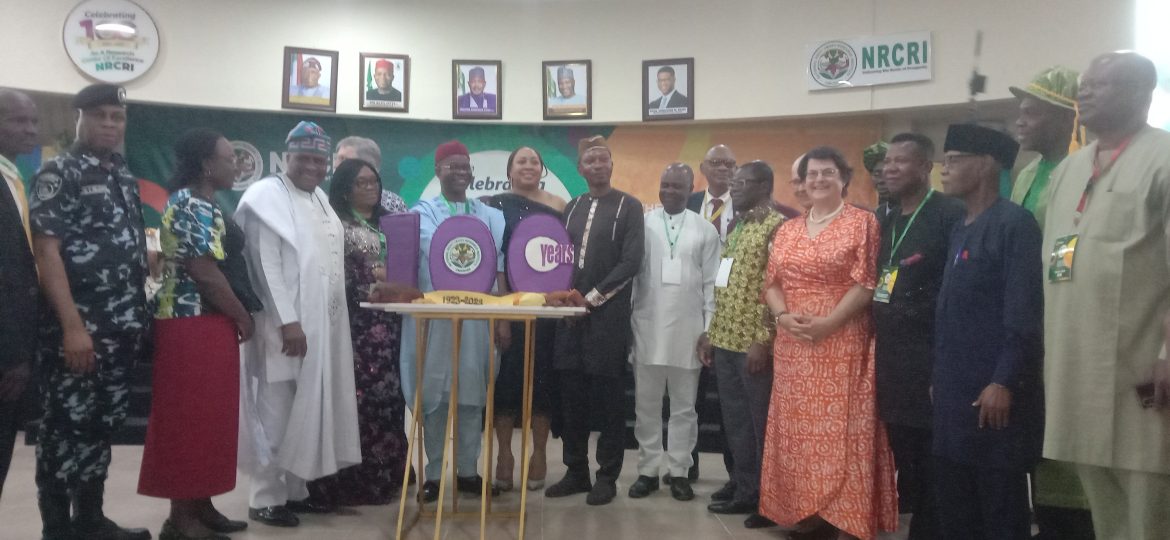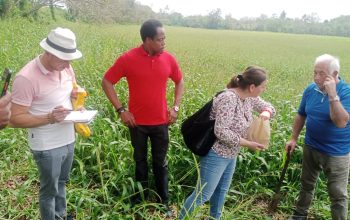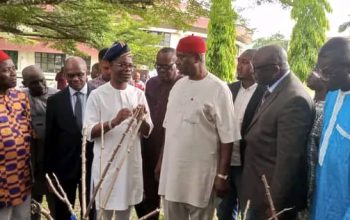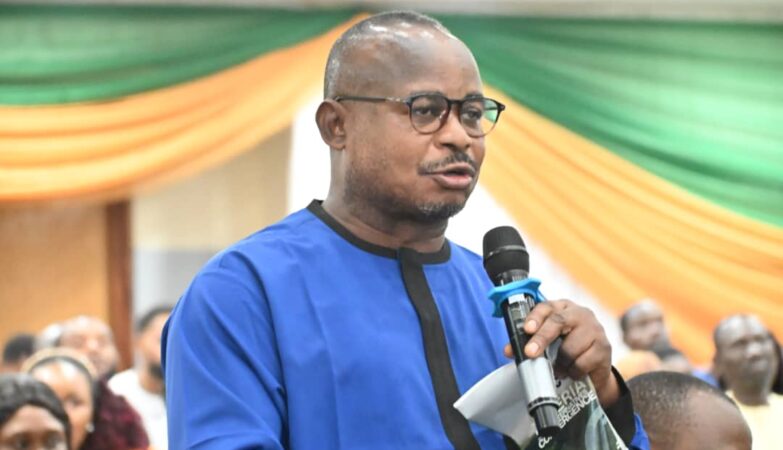President Bola Tinubu has commended the leadership of National Root Crops Research Institute NRCRI, Umudike Abia State for its innovative measures to tackle food security challenge and empower Nigerians through agriculture.
President Tinubu made the commendation on Wednesday through his Senior special Assistant on Agriculture and Agric Business, Dr Kingsley Uzoma during the centennial celebration of the Institute on the theme, NRCRI: a Century of Empowerment through Root and Tuber Crops Research held at the Institute Library Complex, Umudike.
The president noted that the recognition of National Root Crops Research Institute gave the federal government encouragement to assign them to find solution to ginger infection in Kaduna state and in the country and promised to partner the Institute to record other feats. He saluted the dogged leadership of the Executive Director of the institute, Prof Chiedozie Egesi, whom he said that other professors across the globe recognized his efforts in research during one of their functions in the United States recently with the Vice President of Nigeria, Kashim Shettima.
Also speaking, the minister of State for Agriculture and food security, Senator Dr Aliyu Sabi Abdullahi, CON represented by Dr Edet Ekong stressed the need to close the gap between researchers and farmers in Nigeria.
The minister observed that the progress of the Institute has contributed to growth of Nigerian economy, creating opportunities for farmers including those at the rural areas. He added that President Bola Tinubu administration is desirous to see robust transformation through agriculture and called on relevant stakeholder including the Institute to sustain all efforts to reduce hunger in the land. He reminded that the institute progress was in line with the renewed hope agenda of Mr President.
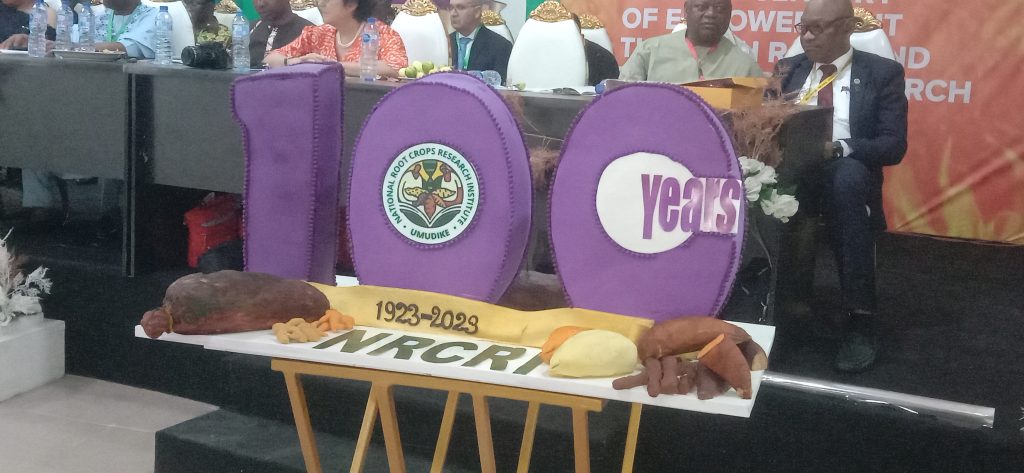
In his remarks, the Executive Secretary, Agricultural Research Council of Nigeria, Professor Garba Hamidu Sharubutu represented by the executive directors, Institute for Agric Research and Training, Ibadan, Dr Veronica Obatolu charged researchers to focus on productivity and not promotion in their offices.
Professor Sharubutu solicited for more out stations to enable the Institute reach more farmers at the rural areas. He added that the federal government under President Bola Tinubu is encouraging more collaborations to address the challenges facing food security.
In his words, “there is the need for Agricultural Research Institutes to align, and share technologies to achieve the zero hunger increase productivity and ultimate higher income. For Nigerians to benefit from the outcome of the numerous Research output from our NARIs including NRCRI to address food and Nutrition security, we all need to restrategize. i want to use this medium to appeal to the
the Executive Director of NRCRI, Umudike to collaborate other National agricultural Research Institute NARIs in area where they do not have representatives. For Instance, he said collaboration with IAR&T will create the opportunity through its Seven (7) outstations to disseminate NRCRI technologies across the four Agro-ecological zones of the Southwest Nigeria in order to reach more farmers towards achieving food security and poverty alleviation.
There is need to collaborate in the by products of root and tuber for livestock feed production and raise the country’s GDP through partnership with attach and ethanol industries
The keynote speaker and, the 2016 world food prize laureat, Dr Jan Low who spoke on the topic “A Century of Empowerment through Root and Tuber Crops Research pointed out that Africa still has malnutrition problem, while covid 19 added to 132 million malnutrition globally.
Therefore, while condemning the use of highly processer foods, she stated that Nigeria can probably get 1.12% annual production growth through the use of quality goods. Dr Jan Low further congratulated the Institute for championing the large production of Cassava.

Earlier in his welcome address, the Executive Director of the National Root Crops Research Institute NRCRI, Umudike, Professor Chiedozie Egesi said NRCRI has done a lot in technological innovations and many a times, they partner with Local and international partners to bring about these innovations, such as new varieties of crops, new technologies for management of the crop, new technologies for seed multiplication, new technologies for preservation of their harvest, and value addition.
Egesi disclosed that they have developed over 50 improved cassava varieties, over 30 yam varieties, sweetpotato 4, potato 10, and ginger 2 among others.
He added that they have also developed in the seed system for root and tuber crops what they call, semi autotrophic and antothropic for cassava, potato, and sweet potato.
According to him, “We have been able to innovate also in the areas of genetic engineering and gene editing, trying to work out how to make our crops to be more resilient, productive and responsive to today’s climatic changes. We are very glad to showcase that, it is achievable in a place like Umudike, here in Abia State, Nigeria”.
Also, research results of NRCRI have led to significant increase in production, farm size, productivity, processing and utilization of root and tuber crops in Nigeria. The Institute has also facilitated the rapid popularization and spread of Research/Developmental activities by trainings, along the value chain for root and tuber crops using the rural empowerment concept.
He added that Nigeria has continued to be ranked first in the world production of cassava, yam and cocoyam with total annual productions of over 60, 44 and 5.49 million metric tonnes for cassava, yam and cocoyam respectively.
He said “Potato (Irish) production in Nigeria has increased from 523,000 metric tonnes in 1975 to over 1 million metric tonnes. The true potato seed (Botanical seed) developed by the Institute has become popular among potato farmers instead of the traditional seed tubers for seed potato production”.
Egesi said, “the Institute has not failed to engage in genetic improvement, promotion and dissemination of improved varieties of root and tuber crops and its value added products. To develop and strengthen the seed system of root and tuber crops in the country, the Institute has created a community of seed entrepreneurs cassava value chain and decentralized vine multipliers in sweet potato value chain in South-East Nigeria. In terms of Technical and vocational training for farmers, students and agro-based industrialist, NRCRI has made the desired impact. In this direction, the institute has trained a lot of people in specialized areas such as multiplication techniques for planting materials and production of value added products such as starch, baby formula, instant fufu, bread, biscuits, flakes, chips etc”.
He continued, “In order to strike a balance between the local consumption and export of garri, the Institute has developed a technology with which garri could be processed and stored for more than one year.
The Institute had based her research on demand and market-driven for Agricultural products and this has led to the development of value-added products from root and tuber crops for local consumption and export.
The event featured presentation of awards to past executive directors and partners of the Institute including posthumous award to late Dr Kenneth Nwosu, fellowship award by the agricultural society of Nigeria to the Executive Director/CEO of NRCRI Umudike, Professor Chiedozie Egesi, goodwill messages from partners including International Institute for Tropical Agriculture, IITA, cutting of centennial celebration cake, exhibition among other activities.

